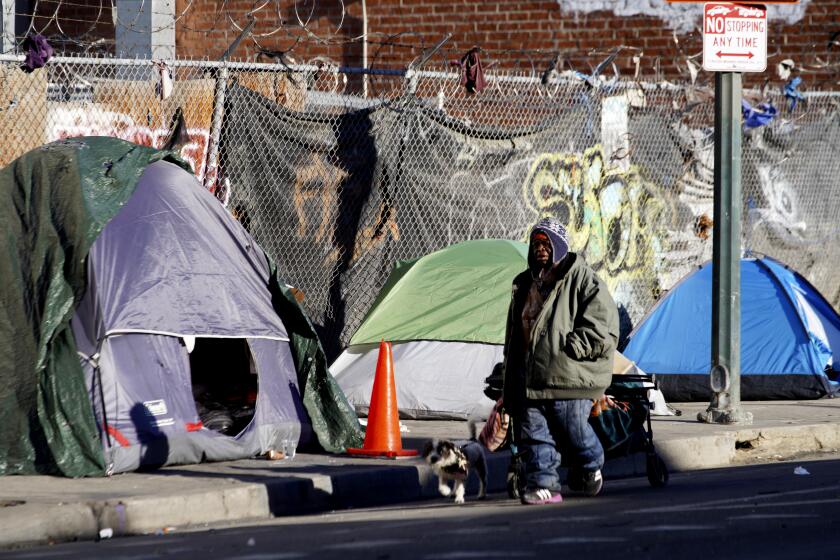Californians back change on three strikes, but not on death penalty
California voters support easing the state’s tough three-strikes sentencing law by a margin of more than 3 to 1 but are reluctant to abolish the death penalty, according to a USC Dornsife/Los Angeles Times poll.
The poll results come as voters ponder a pair of ballot measures that, if approved, would make dramatic changes to the state’s criminal justice system.
Support for an initiative that aims to replace capital punishment with life in prison without parole is trailing 38% to 51%, the poll found. But that gap narrows to a statistical dead heat when voters learn that Proposition 34 also requires convicted killers to work while in prison, directs their earnings to their victims and earmarks $100 million for police to solve murders and rapes.
Despite voters’ ambivalence over capital punishment, a ballot measure seeking to amend the three-strikes law is attracting strong support from a broad cross section, including conservatives. Proposition 36 takes aim at what critics of three strikes call its unfairest feature by changing the law so that offenders whose third strikes were relatively minor, such as shoplifting or drug possession, could no longer be sentenced to 25 years to life in prison.
“We’ve built this society on the idea that the penalty depends on the crime,” said poll respondent Hamilton Cerna, 31, a registered Republican from Downey who works as an employee relations consultant. “If you’re going to take away somebody’s freedom, then I feel like it should be for a damn good reason.”
The measure to soften the three-strikes law was backed by 66%, with only 20% opposed and 14% undecided or not answering. Both ballot initiatives need a simple majority to pass.
The USC Dornsife College of Letters, Arts and Sciences/Los Angeles Times poll canvassed 1,504 registered voters from Sept. 17 to 23. The survey was conducted jointly by the Democratic polling company Greenberg Quinlan Rosner Research and the Republican firm American Viewpoint. The margin of error is 2.9 percentage points.
The propositions target two of California’s most iconic and controversial tough-on-crime sentencing laws.
The “Three Strikes and You’re Out” law won overwhelming voter approval in 1994 amid heightened public anxiety over crime. The law targets offenders who have previous convictions for at least two serious or violent crimes, such as rape or robbery. Any new felony conviction can trigger a prison sentence of at least 25 years to life.
Of the state’s nearly 8,900 third-strikers, about a third were convicted of drug or nonserious property crimes.
Proposition 36 would end life terms for such offenders, who would instead be treated as if they had only one previous strike and be sentenced to double the standard prison term for their latest crime. With the change, a third-striker who would have faced a 25-years-to-life sentence for a nonviolent theft that normally carries two years in prison instead would face four years.
Inmates already serving 25 years to life for nonserious and nonviolent offenses could get a reduction in their sentences if a judge decides they do not pose an unreasonable risk to the public. The proposition’s changes would not apply to offenders with previous convictions for murder, rape or child molestation, or to those whose latest offense involved a sex crime, major drug dealing or use of a firearm.
Advocates of easing the law are making their pitch while the state is under a federal court order to reduce its teeming prison population. They hope to appeal to a large swath of voters who usually favor tough-on-crime laws by emphasizing the measure’s support from Los Angeles County Dist. Atty. Steve Cooley, LAPD Chief Charlie Beck and anti-tax advocate Grover Norquist.
More than half of voters who described themselves as conservative said they supported amending the three-strikes law, with just over a quarter opposing the measure, according to the poll.
“It’s not fair to taxpayers. It’s not fair to the offender,” said Don Chapman of Anaheim, a registered Republican who used to oversee drivers and equipment for a distribution company before retiring.
Although the poll gives the initiative a large advantage, a 2004 attempt to amend the three-strikes law held a similar lead in polls until an advertising blitz by opponents in the final week of the campaign. That proposition lost 53% to 47%.
The current measure is opposed by victims rights groups and more than a dozen law enforcement associations, including the California District Attorneys Assn. and the union that represents rank-and-file LAPD officers.
Opponents note that judges already have the authority to spare a third-striker the maximum sentence. They argue that the proposed amendment removes a powerful tool that has put away dangerous offenders before they could hurt more people.
Norman Tripp, a retired corrections officer and supervising prison counselor who participated in the survey, said he believes the initiative would result in more crime.
“At what point does society say, ‘I’m going to end this person preying on people’?” Tripp, of Susanville, asked.
Proposition 34 offers Californians their first opportunity to decide whether the state should have the death penalty since two-thirds of voters amended the state Constitution to allow capital punishment in 1972.
Only 13 inmates have been put to death in California since executions resumed and none since 2006. California has more than 725 inmates on death row, the most in the nation, and they are more likely to die of old age, illness or suicide than by lethal injection.
The USC Dornsife/Times poll mirrors similar surveys finding that support for the death penalty has waned. When voters were read the proposition language on the November ballot, 43% favored Proposition 34, with 45% against. The margin of error for that result was 4.1%.
The escalating costs of the death penalty — an issue highlighted by the proposition’s supporters — did not move respondents. After voters were told the state could save as much as $130 million annually by abolishing capital punishment, opponents of Proposition 34 still outnumbered supporters by the same margin — 46% to 44%.
Pollsters said the overall results did not bode well for the measure and show that most voters already have firm opinions on the issue.
Susan Estabrook, 52, a teacher’s aide who lives in Marysville and took part in the poll, said the cost had no bearing on her support for executions of murderers.
“If someone commits that heinous of a crime, they just don’t even need to be here,” she said.
Some respondents who favored Proposition 34 said they were motivated as much by whether it was fairly carried out as by cost.
Kevin Calandri, 69, a retired college professor from Sacramento, said he intended to vote to abolish the death penalty because “the people who are more likely to be sentenced to death are poor minorities.”
More to Read
Start your day right
Sign up for Essential California for news, features and recommendations from the L.A. Times and beyond in your inbox six days a week.
You may occasionally receive promotional content from the Los Angeles Times.








